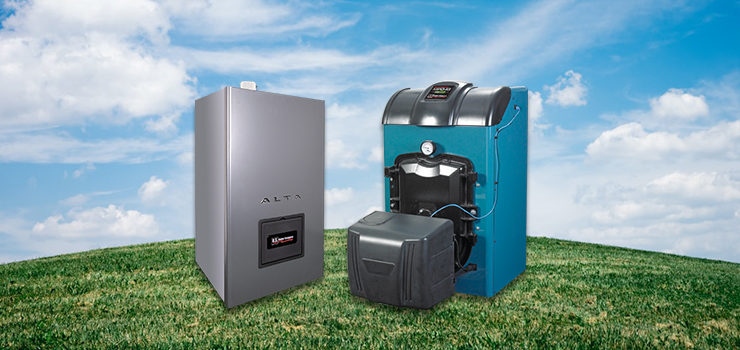How do I make my boiler last as long as possible? That’s not a rare question for homeowners to ask heating contractors. Once a boiler has been installed properly, there are three main factors that determine how “healthy” that boiler will remain over its service life:
- Proper service: Is the unit inspected and cleaned on a regular basis?
- Water quality: Is the water in the boiler at an acceptable pH level and free of minerals and corrosive chemicals?
- Air quality: Is the boiler getting enough air, and is that air pure?
Let’s discuss the latter. Our bodies need an adequate source of clean air to function properly. So does a boiler. Its peak performance depends on clean air that is free from chemicals and pollutants.
A boiler requires oxygen to operate. If the air it draws in contains contaminates, it can be harmful to the boiler. We will look at some of the things that negatively affect a boiler’s combustion/intake air quality and ways to prevent issues from occurring due to contamination.
In a nutshell, the combustion or “intake” air that your boiler receives should be air that you’d be happy to breathe for years and years; clean and plentiful.
When possible, it’s best that combustion air come from outside, though there are boilers designed specifically to draw indoor air. Later in this article, we’ll discuss how your heating contractor will decide where to install the boiler venting during a boiler replacement project. For now, let’s focus on what you can do to protect your boiler if it draws air from indoors. The following also applies to furnaces that draw combustion air from indoors.
Creating quality indoor combustion air
If your boiler draws combustion air from an indoor space – likely a mechanical room, a basement or a garage – take a careful look around.
Keep all flammable liquids, materials, and other chemicals, such as laundry detergents and bleach, away from the boiler. Drawing in lint from a laundry area is also detrimental to a boiler as it has the potential to clog air pathways in the equipment. Listed below are individual items that should be kept as far away from the boiler as possible.
- Spray cans containing chlorocarbons and fluorocarbons
- Chlorinated waxes and cleaners
- Chlorine-based swimming pool/spa chemicals
- Calcium chlorides used for ice melt
- Sodium chlorides used for water softening
- Refrigerant leaks
- Paint or varnish removers
- Hydrochloric acid and muriatic acid
- Cements and glues
- Antistatic fabric softeners used in clothes dryers
- Chlorine type bleaches, detergents, and cleaning solvents found in household laundry rooms
- Adhesives used to fasten building products and other similar products
- Excessive dust and dirt
Placement of venting for outdoor combustion air
Unlike systems that draw air from indoors, all high-efficiency gas-fired appliances and some conventional appliances draw air from outside of the home. This means that the installing contractor will likely need to pipe combustion and exhaust venting through an exterior wall. Understand that your contractor may be somewhat limited to where that venting can be placed, but there is typically some flexibility.
Placement of venting may be impacted by where the mechanical room is located and whether there is a finished basement.
The installer will take note of the surrounding areas where it is possible to install venting. Sources of chemical contamination, excessive pollen, excessive dust, or the possibility of drawing in physical debris are all causes for concern. Dust and pollen can clog orifices, screens, and other small pathways in the gas train. They can also be abrasive, acting like sandpaper by wearing down soft materials over time. Larger debris can damage valves and block screens and passages that supply air and fuel mixtures.
For this reason, be sure that garden and landscape plantings do not grow directly in front of or around the boiler venting. Trim shrubs to keep the venting area clear.
When selecting a location for appliance venting, the installer will also be considering the presence of airborne chemicals in the vicinity, which can damage the appliance.
Outside intake air locations must be selected to avoid the following:
- Dry cleaning/laundry areas and establishments
- Swimming pools
- Barber and beauty shops
- Metal fabrication plants
- Refrigeration repair shops
- Auto body shops
- Photo processing plants
- Plastic manufacturing plants
- Furniture refinishing areas and establishments
- New building construction
- Remodeling areas
- Garages with workshops
- Dryer vents, fume hood vents, etc.
Most of the sources of chemical contaminants listed above are harmful for human inhalation. Some have specific ventilation requirements or even require special breathing apparatus. If you wouldn’t breathe it in, neither should your boiler. To ensure a long and trouble-free life for any boiler, make sure it gets the fresh air it needs!

